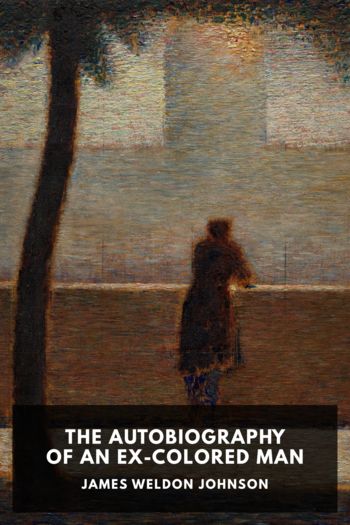The Autobiography of an Ex-Colored Man - James Weldon Johnson (best classic books of all time txt) 📗

- Author: James Weldon Johnson
Book online «The Autobiography of an Ex-Colored Man - James Weldon Johnson (best classic books of all time txt) 📗». Author James Weldon Johnson
The second class, as regards the relation between blacks and whites, comprises the servants, the washerwomen, the waiters, the cooks, the coachmen, and all who are connected with the whites by domestic service. These may be generally characterized as simple, kindhearted, and faithful; not over-fine in their moral deductions, but intensely religious, and relatively—such matters can be judged only relatively—about as honest and wholesome in their lives as any other grade of society. Any white person is “good” who treats them kindly, and they love them for that kindness. In return, the white people with whom they have to do regard them with indulgent affection. They come into close daily contact with the whites, and may be called the connecting link between whites and blacks; in fact, it is through them that the whites know the rest of their colored neighbors. Between this class of the blacks and the whites there is little or no friction.
The third class is composed of the independent workmen and tradesmen, and of the well-to-do and educated colored people; and, strange to say, for a directly opposite reason they are as far removed from the whites as the members of the first class I mentioned. These people live in a little world of their own; in fact, I concluded that if a colored man wanted to separate himself from his white neighbors, he had but to acquire some money, education, and culture, and to live in accordance. For example, the proudest and fairest lady in the South could with propriety—and it is what she would most likely do—go to the cabin of Aunt Mary, her cook, if Aunt Mary was sick, and minister to her comfort with her own hands; but if Mary’s daughter, Eliza, a girl who used to run round my lady’s kitchen, but who has received an education and married a prosperous young colored man, were at death’s door, my lady would no more think of crossing the threshold of Eliza’s cottage than she would of going into a barroom for a drink.
I was walking down the street one day with a young man who was born in Jacksonville, but had been away to prepare himself for a professional life. We passed a young white man, and my companion said to me: “You see that young man? We grew up together; we have played, hunted, and fished together; we have even eaten and slept together; and now since I have come back home, he barely speaks to me.” The fact that the whites of the South despise and ill-treat the desperate class of blacks is not only explainable according to the ancient laws of human nature, but it is not nearly so serious or important as the fact that as the progressive colored people advance, they constantly widen the gulf between themselves and their white neighbors. I think that the white people somehow feel that colored people who have education and money, who wear good clothes and live in comfortable houses, are “putting on airs”—that they do these things for the sole purpose of “spiting the white folks,” or are at best going through a sort of monkey-like imitation. Of course, such feelings can only cause irritation or breed disgust. It seems that the whites have not yet been able to realize and understand that these people in striving to better their physical and social surroundings in accordance with their financial and intellectual progress are simply obeying an impulse which is common to human nature the world over. I am in grave doubt as to whether the greater part of the friction in the South is caused by the whites having a natural antipathy to Negroes as a race, or an acquired antipathy to Negroes in certain relations to themselves. However that may be, there is to my mind no more pathetic side of this many-sided question than the isolated position into which are forced the very colored people who most need and who could best appreciate sympathetic cooperation; and their position grows tragic when the effort is made to couple them, whether or no, with the Negroes of the first class I mentioned.
This latter class of colored people are well-disposed towards the whites, and always willing to meet them more than halfway. They, however, feel keenly any injustice or gross discrimination, and generally show their resentment. The effort is sometimes made to convey the impression that the better class of colored people fight against riding in “Jim Crow” cars because they want to ride with white people or object to being with humbler members of their own race. The truth is they object to the humiliation of being forced to ride in a particular car, aside from the fact that that car is distinctly inferior, and that they are required to pay full first-class fare. To say that the whites are forced to ride in the superior car is less than a joke. And too, odd as it may sound, refined colored people get no more pleasure out of riding with offensive Negroes than anybody else would get.
I can realize more fully than I could years ago that





Comments (0)